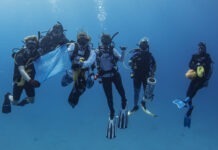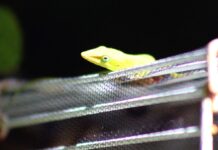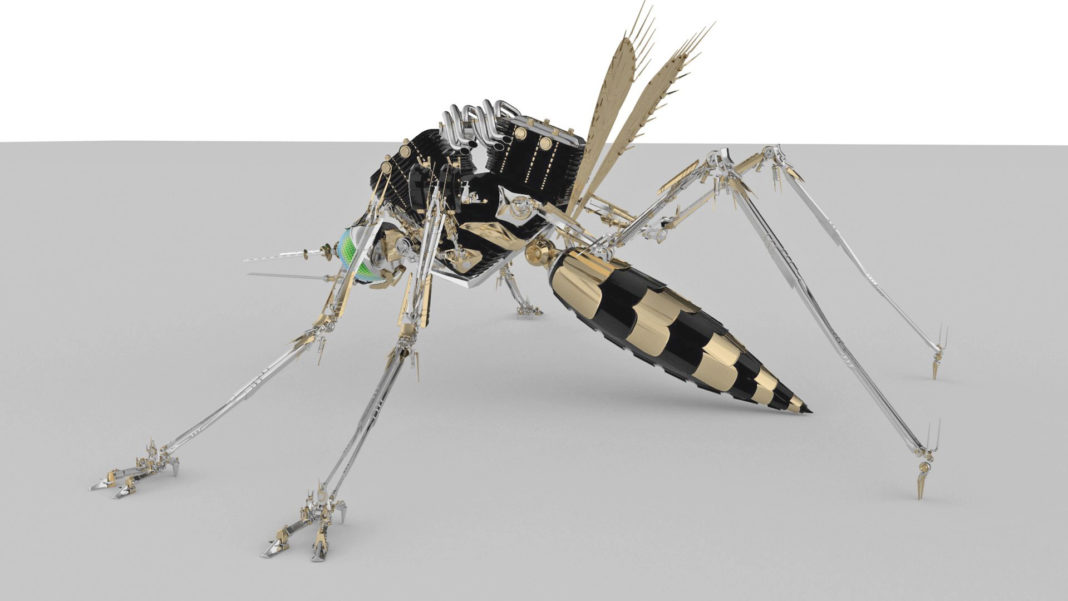Oxitec is back in the Keys, meeting with local officials and hosting town hall meetings, including one on Tuesday, Feb. 20 at 1 p.m. in Marathon. The company is awaiting Environmental Protection Agency approval for trials to release genetically modified mosquitoes in the Florida Keys. It has already passed the Food and Drug Administration examination.
“We expect to be granted the permit by the EPA in the next few months. We can’t guarantee it, but we are expecting it,” said Dr. Derric Nimmo, Oxitec’s principal scientist. “And so we are back in the Keys to engage and help the communities understand what’s going on with the project.”
On Tuesday, the Marathon City Council signed a letter of support for research funding for this type of “vector control” research, but not in support of Oxitec specifically. The state Department of Health is collecting the letters to present to the Centers for Disease Control, which may have funding for research projects.
“We are standing on the sidelines right now,” said Phil Goodman, chairman of the Florida Keys Mosquito Control District. “We are always interested in new technology. In a perfect world, we would be interested in pursuing all three sterile technologies.”
Should approval be granted, and Oxitec receive federal funding, the location for the trials in the Keys would be a joint decision between Oxitec and the Florida Keys Mosquito Control District. This is of particular importance since the Key Haven neighborhood rejected a genetically modified mosquito release in its neighborhood in a non-binding referendum question in the 2016 general election. Precinct 11 voted 65 percent against the study. But in a second referendum question, for the entire county, 31 of 33 precincts approved an “effectiveness trial in Monroe County” of genetically modified mosquitoes by at least half a percentage point.
It’s likely that neighborhoods that approve of the technology trials, as detailed in the 2016 election results, will be heavily courted by Oxitec. For example, Ocean Reef voted 84 percent in favor. The Middle Keys ranged from a 56 percent approval at Kirk of the Keys precinct all the way up to 72 percent approval at Key Colony Beach City Hall precinct. Summerland Key and parts of Big Pine Key and Sugarloaf were also overwhelmingly in favor at near 67 percent.
“We are engaging all of these places to make sure they have the correct information and understand what’s happening,” Dr. Nimmo said.
Should the EPA approval happen, where to conduct the trial will be a science-based discussion; however. Goodman said if the FKMCD were to participate, its board would have to approve, and the location decision would be a joint one with Oxitec.
“We would need current data on where the best mosquito numbers are before we need a site,” he said, adding that it would have to be recent data in order to name a test site, a control site and have the use of a nearby facility.
“We feel we need to make a sterile technique to make significant strides in controlling mosquitoes in the Florida Keys, to feel like the Keys are safe,” said Goodman. “A few days of too much wind and too much rain and good control turns to bad control with the tools that we have now.”
The town hall meeting is Tuesday, Feb. 20 at 1 p.m. at Florida Keys Mosquito Control District headquarters on 107th Street in Marathon.
The Science
Right now, there are three methods of controlling mosquito population through sterilization. All three target the Aedes aegypti mosquito, the primary species responsible for transmitting human viruses.
- The first method is the Wolbachia method, in which mosquitoes are released into the wild after being infected with a naturally occurring bacteria rendering them less able to produce. There have already been trials of this method in the Keys, and a $1.4 million trial is underway in Miami-Dade County. The FKMCD said the short Keys trial had positive results but was, by and large, inconclusive.
- The second method is to irridate mosquitoes, releasing sterile males into the wild to mate with females, so no offspring are produced. This is the same methodology used to treat the recent screwworm outbreak in the Keys, which was eradicated in under a year without spreading to the mainland. However, treatment weakens the mosquito, making it a less effective method.
- The third method is to release male mosquitoes that have been genetically modified. This is the Oxitec technology. Treatments of tetracycline allow the modified mosquito to reach adulthood so as to reproduce with a female, but turns on a “self-limiting” gene so offspring do not survive. The drug also turns on a “marker” gene so scientists can study the mosquito’s impact in the wild.
The genetically modified mosquito method has met with public resistance in the Keys. Dr. John W. Norris of Key West has opposed the technology, citing the possible creation of an antibiotic-resistant scenario that could pose a health threat to humans. Proponents of the technology welcome a way to fight vector diseases (transmitted through the bite of infected insects) such as dengue, Zika, yellow fever and chikungunya. Local veterinarian Dr. Doug Mader said he supports the technology 100 percent, as it will reduce the number of canine heartworm infections — he said he sees four or five a month in the Keys — also a mosquito-borne disease.
Oxitec reports it has positive regulatory findings from independent scientific reviews and regulators from around the world that conclude the genetically modified mosquitoes have no negative effects on human health, animal health or the environment.





















